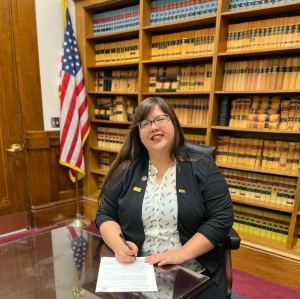Before passage of the Affordable Care Act (ACA), up to 1 in 2 Americans living with a preexisting condition could be discriminated against when accessing health care coverage. For Americans like Rep. Heather Meyer (D-KS), a Type I diabetes diagnosis meant that insurers could deny them insurance or price it far out of reach.
The ACA was literally life changing. As a Type I diabetic, I’ve had a preexisting condition almost all of my life. Prior to the ACA, insurers could deny me coverage. Now, I can have stable health care on an ongoing, affordable basis. The ACA meant that my family could afford to see a doctor on a regular basis and get the care we needed.
Heather Meyer

Heather Meyer is pictured in June 2022. (Photo credit: Heather Meyer)
From the age of 12, Heather experienced what it was like to live in America without health insurance. She and her father—both Type I diabetics—regularly rationed insulin and supplies because they couldn’t afford their health care without insurance. In her young adult years, Heather attended college while caring for her children, meaning she rarely had access to employer-provided health care. So, when the ACA was passed in 2010, it was the first time Heather finally had reliable access to health insurance and insulin.
The ACA’s biggest effect on Heather came from its protections for people with preexisting conditions. Heather accessed ACA insurance for about six years, as subsidies often meant insurance plans on the marketplace were hundreds of dollars cheaper than employer-provided plans. With affordable, reliable health care, Heather could finally access the consistent care she needed for Type I diabetes.
Hear from more storytellers about the ACA's enduring legacy
Read how the ACA has affected American lives and communities.